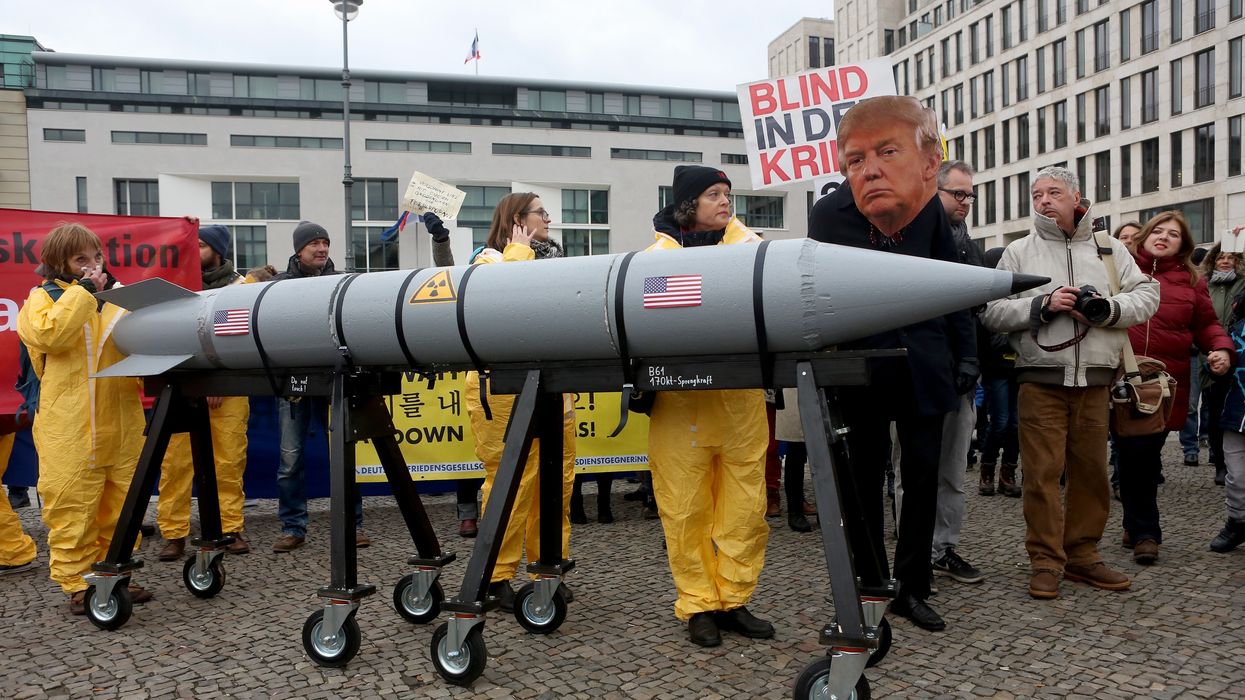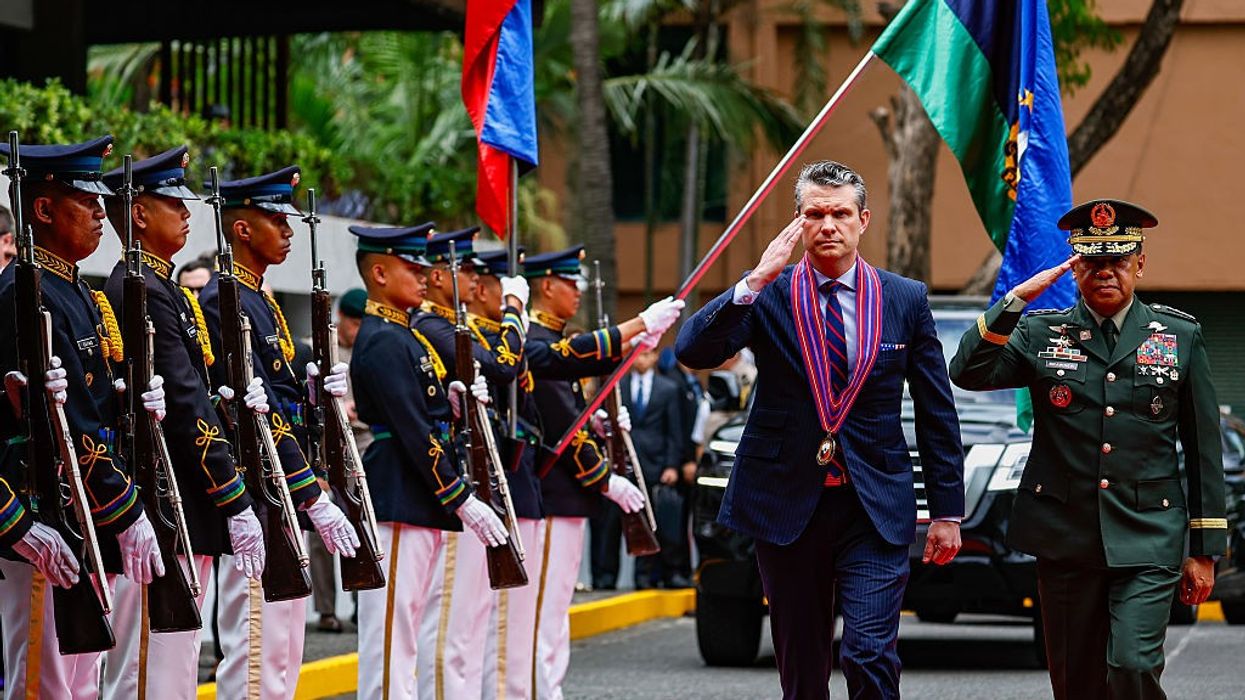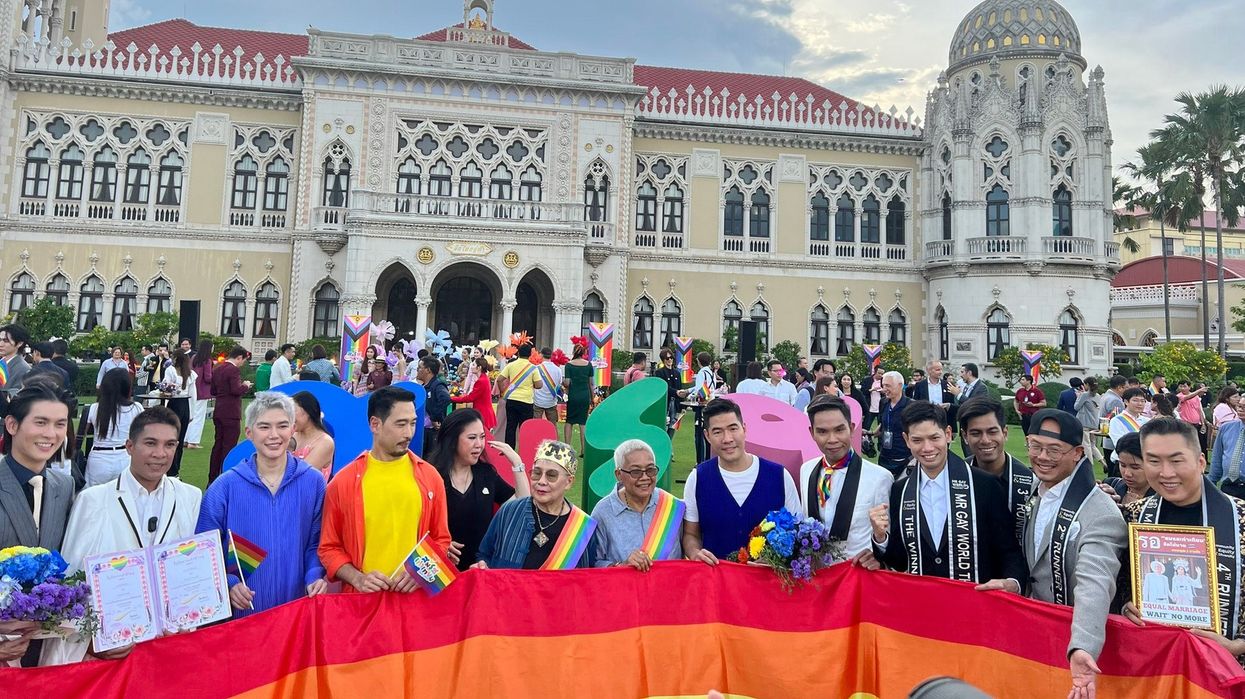The Nuclear Trump Factor
The threat of nuclear war has never been greater than today. The self-proclaimed peacemaker in Washington is to blame.
Hardly a day goes by without the phrase "Donald Trump is a danger to the world" being given new life. The threat posed by the U.S. president applies of course to the U.S. itself, which is in danger of sliding into fascist authoritarianism, and to the planetary boundaries that the billionaire cabinet is enthusiastically trampling all over with its "drill, baby, drill" policy.
What is less noticed is another global threat being driven by the MAGA insurrection movement in the White House, which has declared war on democracy, the state, and the planet. It is the risk of nuclear war. Although Trump is calling for an end to the fighting in Ukraine, which would reduce the threat of nuclear weapons being used in this crisis hotspot, the overall dangers have increased with the new administration.
First of all, it should be kept in mind that in the U.S., the president has sole authority, without restrictions or consultation, to order a nuclear attack against any target at any time, for any reason. He does not have to consult with anyone, and the decision is beyond any control. This is made possible by the so-called "nuclear football" (officially called the "presidential emergency satchel"). Military personnel who carry it accompany the president wherever he goes.
Trump's hara-kiri and doomsday politics, which destroy trust and rely on macho gestures instead of nuclear restraint and international cooperation, are a permanent source of instability and escalation.
The U.S. president can therefore carry out nuclear strikes at any time, which would mean hundreds of millions of deaths and probably the end of humanity. Experts and some politicians in Congress warn that this is a risky, vulnerable, and undemocratic procedure, established by the Eisenhower administration in the late 1950s, which places the decision about the possible end of the world in the hands of a single person. On the other hand, this arrangement is a central element of the U.S. nuclear deterrence strategy, which is intended to send a frightening message to the world.
The mere fact that Donald Trump has once again concentrated this power in his own hands is a danger in terms of the possible use of nuclear weapons. The reasons for this are obvious. Trump has shown himself to be unpredictable, erratic, and emotionally unstable as a person and political leader. His endless lies, provocations, humiliations, and calls for violence are widely known. When he lost the 2020 election to Joe Biden, he initiated and supported an attempted coup on January 6, 2021. As the new president, he ultimately pardoned 1,500 convicted violent criminals, including neo-Nazi leaders who participated in the storming of the Capitol. He also faces multiple charges, including for his efforts to overturn the 2020 election results in his favor, and was convicted of rape by a New York court last year.
In October 2024, over 200 mental health experts warned before the election that Donald Trump was dangerous due to his symptoms of severe, untreatable personality disorder, which they diagnosed as "malignant narcissism." This makes him completely unfit for leadership, according to the health experts. Mary Trump, Donald Trump's niece and a clinical psychologist, also warned against his reelection. In her book Too Much and Never Enough: How My Family Created the World's Most Dangerous Man, she calls her uncle a sociopath. In it, she describes his upbringing in a dysfunctional family that promoted greed, cruelty, and racist and sexist behavior.
At first glance, it may seem reassuring that Trump declared during his first term that nukes were "the biggest problem in the world" and that his goal was to get rid of them. In February 2025, after taking office again, he said, "There's no reason for us to be building brand new nuclear weapons. We already have so many." Unfortunately, this is just rhetoric. Trump has done nothing in this direction so far and has actually increased the nuclear risks through his actions.
In 2018, during his first term as president, Trump announced his withdrawal from the nuclear agreement with Iran, which had successfully limited the uranium enrichment of nuclear fuel in exchange for sanctions relief. Since then, Iran has accelerated its nuclear weapons program. Estimates suggest that Iran could produce several bombs in a matter of months or even weeks. Shortly thereafter, following a series of escalating threats, Trump suggested that North Korea had agreed to denuclearization. Talks followed, but an agreement never materialized.
Furthermore, the first Trump administration indicated to the U.S. Congress that if deterrence against China failed, the U.S. would have to "win" militarily. Peter Kuznick, professor of history and director of the Nuclear Studies Institute at American University, told Truthout: "U.S. politicians seem so panicked about China's enormous growth and the way it is challenging U.S. hegemony in the Pacific that they are willing to risk nuclear annihilation to prevent it."
Researchers at the Bulletin of Atomic Scientists warned earlier this year, as they moved the Doomsday Clock to 89 seconds before midnight—midnight means "game over" for humanity—that the United States has "embarked on the world's most expensive nuclear modernization" and that "the 2024 election results suggest the United States will pursue a faster, more expansive nuclear investment program. It is possible that the United States will expand its nuclear efforts to include more nuclear options, rely more on nuclear brinkmanship to advance its security and deterrence goals, and shun proven efforts to reduce nuclear dangers. The United States is now a full partner in a worldwide nuclear arms race."
This is taking place amid chaotic DOGE (Department of Government Efficiency) attacks led by Elon Musk against the National Nuclear Security Administration (NNSA), in which hundreds of scientists and experts responsible for the country's nuclear security were fired. It is unclear whether all of them have returned to the agency after the layoffs were reversed and whether security gaps are to be feared.
The Trump administration is meanwhile pursuing a "peace through strength" strategy in its foreign policy. This is the motto of former U.S. President Ronald Reagan, under which the U.S. launched a historic wave of rearmament. Republicans in the U.S. Congress also support this concept. They want to fuel the arms race by increasing the already historically high U.S. defense budget. There are calls on Trump to demonstrate to Russia that the U.S. holds global supremacy. And there is pressure to resume nuclear testing in order to win the arms race, which observers view as very worrying. The military establishment is even calling for the reintroduction of tactical nuclear weapons into the U.S. arsenal, which can be used in regional wars, which would mean further dramatic destabilization.
But what increases the nuclear risks above all is that, just months after taking office, the Trump administration has triggered "potentially the fastest and most dangerous acceleration of nuclear arms proliferation around the world since the early Cold War." His repeated "America First" statements, saying that the U.S. no longer feels bound by partnerships and would not come to the rescue of allies in an emergency, have left them feeling abandoned by the United States.
This has sparked a debate in European capitals about whether the U.S. nuclear umbrella can still be relied upon. France and the U.K. have offered to fill the gap. In an interview in March before his election as Germany's new chancellor, Friedrich Merz did not even rule out the idea of developing his own nuclear bomb. And in Poland, Prime Minister Donald Tusk is now talking about his country "must reach for the most modern capabilities also related to nuclear weapons." In Ukraine, President Volodymyr Zelenskyy is openly considering reintroducing a nuclear deterrent.
The risk of nuclear weapons spreading further across the globe is greatest in East Asia. During his 2016 election campaign, Trump said that Japan and South Korea might have to develop nuclear weapons. "It's only a matter of time," he said. Former South Korea's right-wing president, Yoon Suk Yeol, finally welcomed the deployment of U.S. tactical weapons in South Korea and intended to arm his country with nuclear weapons. Even though Democratic Party candidate Lee Jae-myung, who is leading in the presidential election polls (official vote is on Tuesday, June 3), is skeptical about South Korea going nuclear, the debate continues in the country. Political scientists Jami Levin and Youngwon Cho see this as a fatal development:
While Trump has been busy burning bridges in Europe and North America, his allies in East Asia—South Korea and Japan—have been watching the implosion of the U.S.-led international order in dismay. They have no alternative to the American nuclear umbrella but to build their own deterrent capabilities.
Polls show that more than two-thirds of South Koreans support their country acquiring nuclear weapons independently of the U.S.
Above all, the increasing confrontation with China is viewed with concern. The tariff war that Trump started against Beijing could exacerbate the security crisis in the Pacific and end in a military conflict, according to fears. Trump's trade attacks are reinforcing the trend toward "decoupling," i.e., the economic disentanglement of the two economies from one another. This, in turn, could lead to a rivalry in which both sides are tempted to harm each other through proxy conflicts and attacks on national security. At the same time, strategy papers from the Pentagon show how easily an economic war can escalate into a military conflict (which would put the nuclear option on the table between the two nuclear powers), according to Jack Werner of the Quincy Institute for Responsible Statecraft in the U.S.:
In a context of mounting economic pain on both sides, with surging nationalism in both countries becoming a binding force on leaders, both governments are likely to choose more destructive responses to what they regard as provocations from the other side. A single misstep around Taiwan or in the South China Sea could end in catastrophe.
Trump's economic and military advisers in the White House are geared toward confrontation with China. That is also the purpose of the presidential order to build a new space-based missile defense system, known as the "Golden Dome." Since Reagan, there have been repeated attempts to initiate such programs. U.S. President Barack Obama wanted to build ABMs (anti-ballistic missiles) in Eastern Europe, but it was only in the wake of the Ukraine war that the Czech Republic gave the green light.
However, all these missile defense systems are not about the possible interception of nuclear intercontinental ballistic missiles, i.e., self-defense, which cannot work technically, as military analysts have determined. ABM is, as the Rand Corporation, among others, explains, "not just a protective shield, but an enabler of U.S. actions." Lawrence Kaplan, professor at the U.S. Army War College and former senior editor of The New Republic, sums it up as follows: "In other words, missile defense is about preserving America's ability to exercise power abroad. It's not about defense. It's about offense. And that's exactly why we need it."
Even if such defense systems are incapable of preventing nuclear first strikes, they have the advantage of theoretically intercepting retaliatory strikes by enemies in response to a first strike. This means that there would be no threat of self-destruction, which could encourage military planners in the U.S. to launch first strikes while other nuclear powers lose their deterrent capability. And the message of Trump's "Golden Dome" has been received by those who were targeted. China, like Russia, has described the announcement from Washington as a "destabilizing" initiative.
While Trump has initiated negotiations in the Ukraine war that could reduce the nuclear dangers between NATO and Russia, he is simultaneously increasing them in the Pacific in an economic and military confrontation now focused on his main adversary, China, which increases the likelihood of a nuclear conflict.
The same applies to the Middle East. The Gaza war waged by Israel's Netanyahu government, a nuclear power, continues to be enabled by the U.S. with weapons and diplomatic blockade, while Trump has promoted the ethnic cleansing of the completely sealed-off enclave with his "Riviera Plan" remarks. The massacre of Palestinians, which has been going on for over a year and a half, has the potential to set the entire region ablaze. This is evident from the military exchanges with the Houthis in Yemen, Hezbollah in Lebanon, and Iran. Israeli Minister of Heritage Amichai Eliyahu even suggested in an interview that dropping a "nuclear bomb" on the Gaza Strip was "an option."
Israel is also regularly indicating that one prepares for an attack on Iranian nuclear facilities. Tehran has declared that it will hold Washington responsible if this happens. This could spark a full-scale war in the region that would draw the U.S. into the conflict, with all the dangers that this entails. At the same time, Trump is exacerbating the conflict himself. Although he wants to negotiate with Iran, he has announced military action if Tehran does not agree to his deal and end all uranium enrichment—which experts consider a dangerous hardline demand that will ultimately lead to war. They argue that it is unnecessary and unacceptable for the country because it would also rule out the civilian use of nuclear power for Iran. Trump threatened that if Tehran did not completely shut down its nuclear program, there would be "all hell to pay," while "all options are on the table"—which is an implicit threat of a nuclear strike.
A similar threat was directed at Russia. On social media, Trump stated on May 28: "What Vladimir Putin doesn't realise is that if it weren't for me, lots of really bad things would have already happened in Russia, and I mean REALLY BAD. He's playing with fire." Putin's confidant and Deputy Chairman of the Security Council of the Russian Federation, Dmitry Medvedev, replied: "Regarding Trump's words about Putin 'playing with fire' and 'really bad things' happening to Russia. I only know of one REALLY BAD thing—WWIII."
It is at this point a war of words between two nuclear powers. But Trump's hara-kiri and doomsday politics, which destroy trust and rely on macho gestures instead of nuclear restraint and international cooperation, are a permanent source of instability and escalation. It is therefore important to raise public awareness of the existential threat once again as civil society pressure on governments especially in countries that possess nuclear arms has to increase by seeking ways to revive the policy of détente—i.e. negotiations on disarmament and arms control, as took place in the 1970s under U.S. President Richard Nixon and in Germany with Chancellor Willy Brandt's Ostpolitik. Even under President Bush senior, there were initiatives launched that reduced the risks. These deescalation efforts are the results of organized peace movements that made a difference. Even in the dark times today there are still possibilities for addressing the dangers of atomic annihilation.


